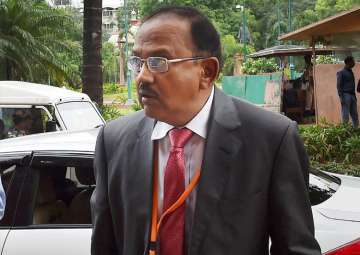Ajit Doval arrives in Beijing for BRICS NSAs meeting amid Sikkim stand-off
National Security Advisor Ajit Doval arrived here today to attend BRICS top security officials meeting amid military stand-off in Dokalam.

Amid the Sikkim stand-off, National Security Advisor Ajit Doval arrived here today to attend BRICS top security officials meeting during which he is expected to hold talks with China's State Councilor Yang Jiechi to resolve the issue. Doval arrived here to take part in the Brazil, Russia, India, China, South Africa (BRICS) NSAs meeting in Beijing which is due to take place on July 27-28. His visit has raised expectations about the likelihood of India and China finding a way-out of the over a month-long standoff at Doklam area in Sikkim sector.
As per the official programme, Doval will also call on Chinese President Xi Jinping on Friday along with fellow top security officials of the BRICS countries. The group of NSAs would call on the Chinese President for an interaction on security issues relating to BRICS countries.
The BRICS NSAs meeting is being hosted by Yang. Both Doval and Yang are Special Representatives of the India-China border mechanism.
China currently holds the Presidency of the BRICS and is due to hold 2017 summit of the five-member group in September at Xiamen city.
Ahead of his meeting with Xi, Doval is expected to hold separate talks with Yang to discuss resolution of the standoff at Doklam in Sikkim sector.
Though China continued to maintain that there won’t be a meaningful dialogue without the unconditional withdrawal of Indian troops, the Chinese foreign ministry has hinted of a bilateral meeting between Doval and Yang which is part of the tradition of BRICS NSAs meeting.
Both sides acknowledged talks through diplomatic channels to ease tensions.
Chinese and Indian troops have been locked in a face-off in the trijunction area for more than a month since Indian troops stopped the Chinese army from building a road in the area. China claimed it was constructing the road within its territory. India protested the construction, fearing it would allow China to cut India's access to its northeastern states.
Ahead of Doval's visit, Foreign Ministry spokesman Lu Kang reiterated that no meaningful dialogue can be held with India until it "unconditionally" withdraws troops from the disputed Doklam area. He also said Foreign Minister Wang Yi has authoritatively made Beijing's position clear on the issue.
Wang, who is the first top Chinese leader to have commented so far on the Dokalam impasse, yesterday claimed that India "admitted" to entering Chinese territory. He said that India should "conscientiously withdraw" its troops from the area.
"The remarks of Foreign Minister Wang Yi are authoritative and has made our position clear. I don't have anything to explain," Lu told a media briefing. Lu, however, declined to react to reports that both sides have deployed over 3,000 troops each at Dokalam, saying the question should be referred to the Chinese Defence Ministry.
He once again said China will not hold any meaningful dialogue without Indian troops' withdrawal. "I have stressed many times that the crux of this incident is that the Indian border troops illegally trespassed into China’s territory and the solution as Wang put it is for Indian border troops to pull-out unconditionally. This is a precondition basis for any meaningful talks between the two countries," Lu said.
External Affairs Minister Sushma Swaraj had told Parliament last Thursday that both sides should first pull back their troops for any talks to take place, favouring a peaceful resolution of the border stand.